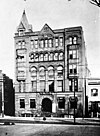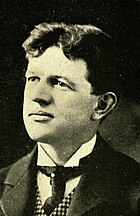Yost & Packard
Yost & Packard was an architectural firm based in Columbus, Ohio, United States. The firm included partners Joseph W. Yost and Frank Packard. It was founded in 1892 and continued until Yost moved to New York City in 1899, after which Packard took up practice in his own name.[1]
The firm was known for many public buildings, and the prolific use of masonry, especially Berea sandstone, along with tile roofs with flared eaves, polygonal turrets, and intricate ornamentation. Their works resemble elements of Richardsonian Romanesque architecture blended with the creative Victorian works of Frank Furness.[1]
Selected works
[edit]Notable works by Yost & Packard include:[2]
In Columbus
[edit]| Historical name | Image | Address | Date completed | Status | Notes |
|---|---|---|---|---|---|
| Armory and Gymnasium |  |
60 N. Oval Drive | 1898 | Demolished | [3] |
| Biological Building |  |
101 S. Oval Drive | 1898 | Demolished | [4] |
| Boiler and Power Houses | 1961 Bohannan Drive | 1892, 1896 | Demolished | Also known as the Brown Hall Annex[5] | |
| Botanical Building |  |
181 S. Oval Drive | 1892 | Demolished | [6] |
| Broad Street M.E. Church |  |
501 E. Broad Street | 1885 | In use | National Register and Columbus Register-listed |
| Chemical Laboratory |  |
154 N. Oval Drive | 1891 | Demolished | Also known as Chemistry Building No. 2.[7] |
| Children's Hospital |  |
Fair & Miller Avenues | 1893 | Demolished | Original location of the modern-day Nationwide Children's Hospital[8] |
| Columbus Auditorium |  |
W. Goodale Street | 1897 | Demolished | Extensively remodeled existing building |
| Columbus Central St. Ry. Office Building |  |
842 Cleveland Avenue | 1890s | Vacant | |
| Columbus Central St. Ry. Power House |  |
Cleveland & Reynolds Avenues | 1894 | Demolished | |
| Eastwood Congregational |  |
1080 E. Broad Street | 1892 | In use | Now the Pilgrim Missionary Baptist Church |
| The Great Southern Hotel and The Great Southern Opera (advisory) |  |
310 S. High Street | 1896 | In use | National Register and Columbus Register-listed |
| The Hanna Paint Company building |  |
111 E. Long Street | Demolished | ||
| Hayes Hall |  |
108 N. Oval Mall | 1893 | In use | National Register-listed, OSU building |
| Hotel Chittenden and Henrietta Theater |  |
205 N. High Street | 1895 | Demolished | |
| Masonic Temple |  |
34 N. 4th Street | 1898 | In use | National Register-listed. One among several initial architects before further expansions[9] |
| Mt. Vernon Ave. M.E. Church |  |
Mt. Vernon Avenue and 18th Street | Demolished | ||
| Neil Ave. M.E. Church |  |
610 Neil Avenue | In use | Now The Sanctuary on Neil[10] | |
| Neil House (remodeling) | 41 S. High Street | Demolished | |||
| O.L. Rankin house |  |
98 Buttles Avenue | Demolished | Also known as the E.W. Vance house and as Hutchinson Hall, nurse's home for White Cross Hospital[11] | |
| Orton Hall |  |
155 Oval Drive South | 1893 | In use | National Register-listed, OSU building |
| Peter Sells House |  |
755 Dennison Avenue | 1895 | In use | National Register-listed |
| Public School Library |  |
4 E. Town Street | 1892 | Demolished | Remodeled former church |
| Second German M.E. Church |  |
119 E. Gates Street | In use | Now Gates-Fourth United Methodist Church | |
| St. Francis R. C. Church |  |
386 Buttles Avenue | 1896 | In use | Also known as St. Francis of Assisi Catholic Church |
| T&OC Passenger Station |  |
379 W. Broad Street | 1895 | In use | National Register-listed |
| Town Street M.E. Church |  |
873 Bryden Road | 1900 | In use | Now the First AME Zion Church[12] |
| Twenty-Third Street School |  |
1235 Mt. Vernon Avenue | 1888 | Demolished | Later known as Mount Vernon Junior High School |
| Universalist Church |  |
331 E. State Street | 1891 | Demolished | |
| YMCA Building |  |
34 S. 3rd Street | 1893 | Demolished | Moved to the Downtown YMCA building in 1923; site now occupied by the Columbus Dispatch Building |
Additionally, the Charles Frederick Myers house in Columbus is suspected to be a Yost & Packard work.[13]
Outside Columbus
[edit]| Historical name | Image | Address | Date completed | Status | Notes |
|---|---|---|---|---|---|
| Harrison County Courthouse |  |
100 W. Market Street, Cadiz, Ohio | 1895 | In use | National Register-listed[14] |
| Westerville High School-Vine Street School |  |
44 N. Vine Street, Westerville, Ohio | 1896 | In use | Now the Emerson Elementary School. National Register-listed.[14] |
| Wood County Courthouse and Jail |  |
1 Court House Square, Bowling Green, Ohio | 1896 | In use | National Register-listed[14] |
| First Church of Christ, Scientist |  |
2704 Monroe Street, Toledo, Ohio | 1898 | In use | National Register-listed[14] |
| Odd Fellows' Home for Orphans, Indigent and Aged |  |
Springfield, Ohio | 1898 | In use | National Register-listed[14] |
| St. Joseph's Catholic School |  |
Wapakoneta, Ohio | 1899 | In use | National Register-listed[14] |
| Wyandot County Courthouse and Jail |  |
Upper Sandusky, Ohio | 1900 | In use | National Register-listed[14] |
| Loewenstein and Sons Hardware Building |  |
Charleston, West Virginia | 1900 | In use | National Register-listed[14] |
| Marion County Court House |  |
Fairmont, West Virginia | 1900 | In use | National Register-listed[14] |
| Franklin College Building No. 5 |  |
New Athens, Ohio | 1900 | In use | National Register-listed[14] |
Additionally, the firm designed the First Presbyterian Church, Urbana High School, the Pennsylvania Railroad Depot, and a barn for Frank Chance at 438 Scioto Street, and the house of Mrs. M.J. Laudenbach (524 Scioto Street), all in Urbana, Ohio.[15] In St. Marys, Ohio, the firm designed the Grand Opera House (105-113 W. Spring St., 1895, extant) and the Gustave Bamberger residence (225 South Wayne Street, built 1895, extant).[2]
See also
[edit]References
[edit]- ^ a b Barbara Powers, "Toledo and Ohio Central Railroad Station", [Columbus, Ohio], SAH Archipedia, eds. Gabrielle Esperdy and Karen Kingsley, Charlottesville: UVaP, 2012—, http://sah-archipedia.org/buildings/OH-01-049-0046. Last accessed: December 4, 2022.
- ^ a b "Classified List Of Public and Private Structures, by Yost & Packard" (PDF). Portfolio of Architectural Realities. 1897. OCLC 81808814. Archived (PDF) from the original on December 4, 2022. Retrieved August 18, 2023 – via Grandview Heights/Marble Cliff Historical Society.
- ^ "Armory - Herrick Archives Number H 202" (PDF). Retrieved 2023-08-29.
- ^ Herrick, John H. (November 14, 2006). "Biological Hall". The Ohio State University. hdl:1811/24191.
- ^ "Brown Hall Annex - Herrick Archives Number 017" (PDF). Retrieved 2023-08-29.
- ^ Herrick, John H. (November 14, 2006). "Botanical Hall". The Ohio State University. hdl:1811/24234.
- ^ "Chemistry Building No. 2 - Herrick Archives Number H 118" (PDF). Retrieved 2023-08-29.
- ^ "History Lesson: The growth of Nationwide Children's Hospital". June 8, 2012.
- ^ National Register of Historic Places Registration Form. File Unit: National Register of Historic Places and National Historic Landmarks Program Records: Ohio, 1964 - 2013. National Park Service. Retrieved June 30, 2021.
- ^ "New Wedding & Event Venue Opening in Victorian Village Early Next Year". November 30, 2020.
- ^ "Columbus Metropolitan Library". Retrieved 2023-08-29.
- ^ "The New Town Street Church". The Columbus Dispatch. May 20, 1896. p. 10. Retrieved February 6, 2023.
- ^ "National Register of Historic Places - Inventory -- Nomination Form for Columbus Near East Side District" (PDF). Retrieved 2023-08-29.
- ^ a b c d e f g h i j "National Register Information System". National Register of Historic Places. National Park Service. November 2, 2013.
- ^ "Historical Markers in Champaign County, Ohio".
External links
[edit] Media related to Yost & Packard at Wikimedia Commons
Media related to Yost & Packard at Wikimedia Commons


